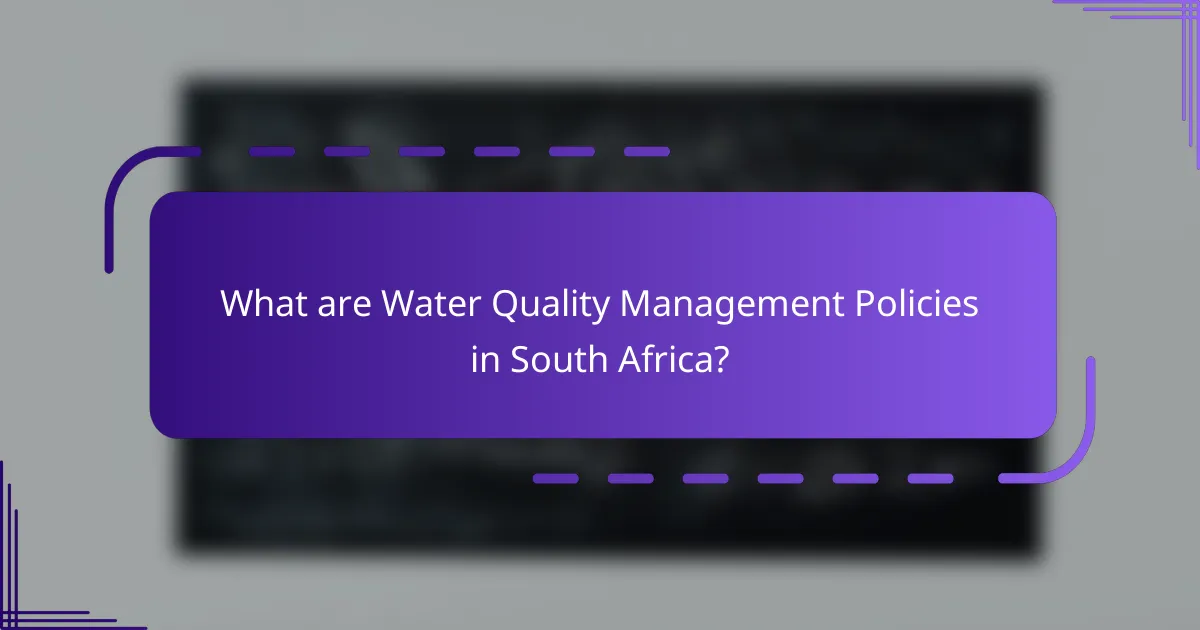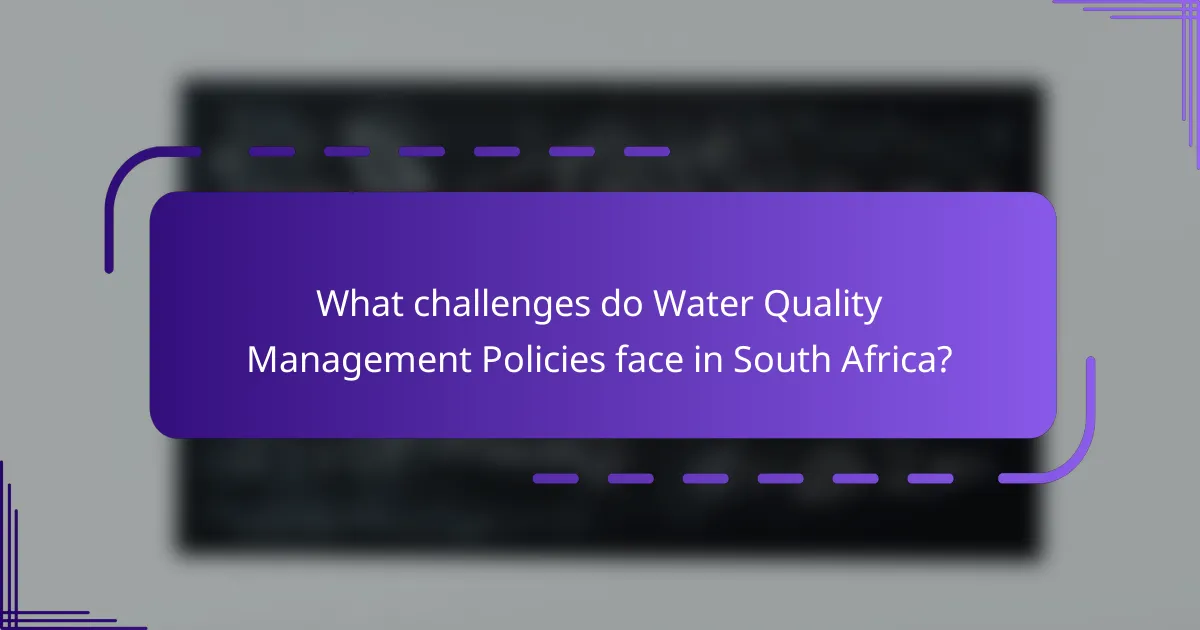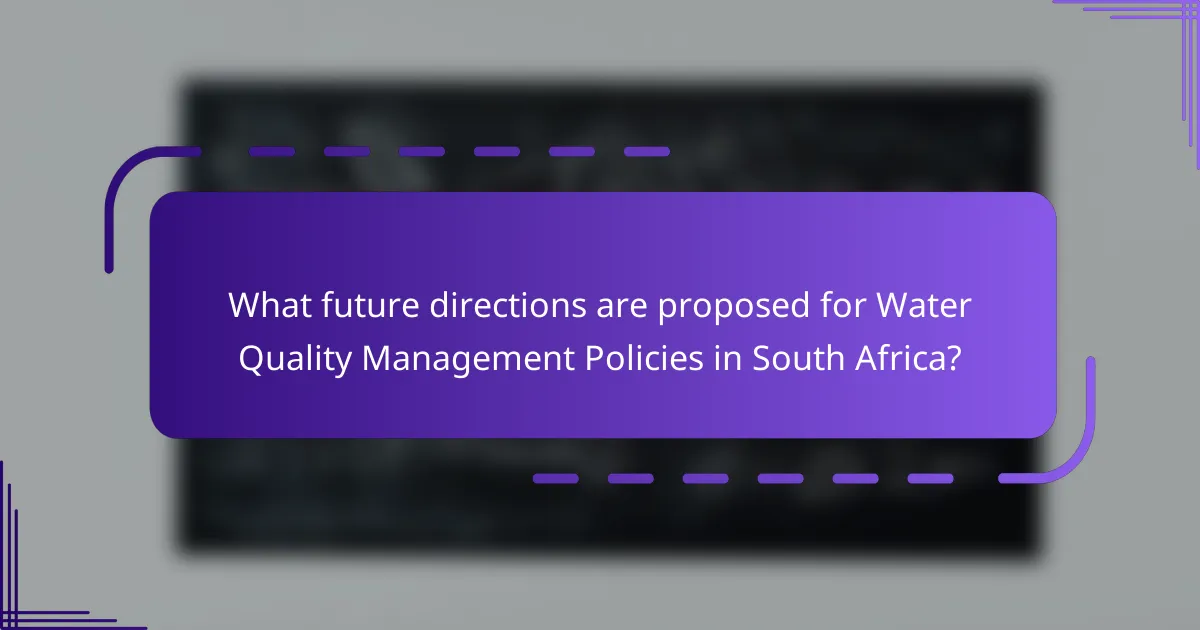Water Quality Management Policies in South Africa are essential frameworks aimed at the sustainable management of the country’s water resources. These policies, primarily guided by the National Water Act of 1998, focus on protecting water quality for human consumption, agriculture, and ecosystems. Key aspects include monitoring and assessing water quality, setting standards, and preventing pollution, with enforcement overseen by the Department of Water and Sanitation. The article addresses significant challenges such as inadequate infrastructure, pollution from various sources, and the impacts of climate change on water quality. It also discusses future directions for these policies, emphasizing the need for enhanced regulatory frameworks, stakeholder engagement, and investment in infrastructure to achieve better water quality outcomes.

What are Water Quality Management Policies in South Africa?
Water Quality Management Policies in South Africa are frameworks designed to ensure the sustainable management of water resources. These policies aim to protect water quality for human consumption, agriculture, and ecosystem health. The National Water Act of 1998 is a foundational piece of legislation guiding these policies. It establishes the principles of integrated water resource management and promotes equitable access to water.
The policies also emphasize the importance of monitoring and assessing water quality. This includes setting water quality standards and implementing measures to prevent pollution. The Department of Water and Sanitation oversees the enforcement of these policies. Collaboration among government entities, local communities, and stakeholders is crucial for effective implementation.
In recent years, challenges such as pollution, climate change, and inadequate infrastructure have impacted water quality. These challenges necessitate ongoing revisions and improvements to the management policies. The policies are aligned with international standards and practices to enhance their effectiveness.
How do these policies impact water quality in the country?
These policies significantly improve water quality in South Africa. They establish regulations that limit pollutants entering water bodies. Enhanced monitoring systems track water quality metrics. Enforcement of standards reduces industrial discharge of harmful substances. Communities benefit from improved access to clean water. Policies promote sustainable water usage practices. Research indicates a decrease in waterborne diseases due to these measures. Overall, the policies foster a healthier ecosystem and safer drinking water for the population.
What are the key components of water quality management policies?
Key components of water quality management policies include regulatory frameworks, monitoring and assessment, stakeholder engagement, and pollution control measures. Regulatory frameworks establish legal standards for water quality. Monitoring and assessment involve regular testing of water sources to ensure compliance with standards. Stakeholder engagement fosters collaboration among government, industry, and communities. Pollution control measures are implemented to mitigate contaminants from various sources. These components are essential for maintaining safe and sustainable water resources.
How do these policies align with international standards?
These policies align with international standards by adhering to guidelines set by organizations such as the World Health Organization (WHO) and the United Nations (UN). South Africa’s water quality management policies incorporate principles from the WHO’s drinking water quality guidelines. They also align with the UN’s Sustainable Development Goals, particularly Goal 6, which focuses on clean water and sanitation. The policies emphasize monitoring and regulating water quality to meet these international benchmarks. Additionally, they promote stakeholder engagement and transparency, reflecting global best practices in water governance. This alignment enhances South Africa’s commitment to ensuring safe and sustainable water resources.
What is the historical context of water quality management in South Africa?
Water quality management in South Africa has evolved significantly since the early 20th century. Initially, water quality was primarily governed by colonial regulations, which lacked comprehensive frameworks. The 1998 National Water Act marked a pivotal shift towards integrated water resource management. This act aimed to promote equitable access and sustainable use of water resources. In 2004, the National Water Quality Management Policy was introduced, emphasizing the importance of water quality monitoring and protection. The policy aimed to address pollution and ensure safe drinking water. Historical challenges include industrial pollution and inadequate infrastructure. These factors have shaped the current landscape of water quality management in the country.
What significant events have shaped current policies?
The significant events that have shaped current water quality management policies in South Africa include the establishment of the National Water Act in 1998. This act marked a shift towards integrated water resource management. The 2004 Water Services Act further emphasized equitable access to water services. The 2012 National Water Resource Strategy outlined objectives for sustainable water management. Additionally, the 2015 United Nations Sustainable Development Goals influenced local policies towards improved water quality. The ongoing impacts of climate change have also necessitated adaptations in water management strategies. These events collectively reflect the evolution of policies aimed at addressing water quality challenges in South Africa.
How have past challenges influenced present frameworks?
Past challenges in water quality management have significantly shaped present frameworks in South Africa. Historical issues, such as pollution and water scarcity, have led to the development of more stringent regulatory measures. For instance, the 1998 National Water Act was influenced by previous failures to address water quality. This act established a framework for sustainable water management and emphasized the importance of stakeholder participation. Additionally, past challenges highlighted the need for integrated approaches, resulting in frameworks that consider ecological, social, and economic factors. The lessons learned from past crises, like the 2014 water crisis in Cape Town, have prompted the incorporation of adaptive management strategies in current policies. These strategies aim to enhance resilience against future water quality challenges. Overall, past difficulties have driven the evolution of more comprehensive and responsive water quality management frameworks in South Africa.

What challenges do Water Quality Management Policies face in South Africa?
Water Quality Management Policies in South Africa face several significant challenges. These challenges include inadequate infrastructure for water treatment and distribution. Many areas lack the necessary facilities to ensure safe drinking water. Pollution from industrial and agricultural sources further complicates water quality management. This pollution often exceeds acceptable limits, affecting both surface and groundwater. Additionally, there is a lack of effective regulatory enforcement. Compliance with existing water quality standards is often insufficient. Furthermore, limited financial resources hinder the implementation of necessary improvements. Many municipalities struggle to allocate funds for water quality initiatives. Lastly, climate change impacts exacerbate water scarcity and quality issues. This leads to increased competition for water resources among various sectors.
What are the primary environmental challenges impacting water quality?
The primary environmental challenges impacting water quality include pollution, climate change, and habitat destruction. Pollution from agricultural runoff introduces pesticides and fertilizers into water bodies. Industrial discharges release heavy metals and toxins, compromising aquatic ecosystems. Climate change alters precipitation patterns, leading to increased flooding and erosion. These changes can introduce sediments and pathogens into water sources. Habitat destruction from urban development reduces natural filtration systems. Together, these factors significantly degrade water quality in South Africa.
How do pollution sources affect water resources?
Pollution sources negatively impact water resources by introducing harmful substances into water bodies. These substances include chemicals, heavy metals, and pathogens. Contaminated water can harm aquatic life and disrupt ecosystems. Industrial runoff is a significant contributor to water pollution. Agricultural activities also release fertilizers and pesticides into nearby water sources. Urban runoff carries oils, plastics, and waste into rivers and lakes. These pollutants can lead to health risks for humans who consume or come into contact with contaminated water. According to the World Health Organization, over 2 billion people lack access to safe drinking water due to pollution. Effective water quality management policies are essential to mitigate these impacts and protect water resources.
What role does climate change play in water quality management?
Climate change significantly impacts water quality management. It alters precipitation patterns, leading to increased flooding and droughts. These changes can cause runoff that carries pollutants into water bodies. Warmer temperatures can also enhance the growth of harmful algal blooms. Such blooms degrade water quality and pose health risks. Additionally, climate change affects the availability of freshwater resources. This situation complicates the management of water supply and quality. Effective water quality management must adapt to these evolving climate conditions.
What socio-economic challenges hinder effective policy implementation?
Socio-economic challenges that hinder effective policy implementation include poverty, lack of education, and inadequate infrastructure. Poverty limits access to resources necessary for compliance with policies. Lack of education affects public awareness and understanding of water quality issues. Inadequate infrastructure hampers the delivery of services and the implementation of water management strategies. Additionally, unequal distribution of resources creates disparities in policy impact across different communities. Research shows that areas with higher poverty levels experience more significant challenges in policy adherence. This correlation emphasizes the need for targeted interventions to address these socio-economic barriers.
How does poverty influence access to clean water?
Poverty significantly limits access to clean water. Individuals in impoverished areas often lack the financial resources to pay for water services. This results in reliance on unsafe water sources, such as rivers or unregulated wells. According to the World Health Organization, over 2 billion people live in water-stressed countries, with poverty exacerbating the issue. In South Africa, communities in poverty face inadequate infrastructure for water delivery. The lack of investment in water systems further deteriorates access for low-income populations. As a result, health issues related to contaminated water are prevalent in these communities.
What are the impacts of urbanization on water quality management?
Urbanization significantly impacts water quality management by increasing pollutant loads in water bodies. As cities expand, impervious surfaces like roads and buildings prevent water absorption. This leads to higher runoff, which carries pollutants such as oils, heavy metals, and nutrients into water systems. According to the World Health Organization, urban runoff contributes to the degradation of water quality, affecting both human health and aquatic ecosystems. Additionally, increased population density raises water demand, straining existing water treatment facilities. This can result in inadequate treatment, allowing contaminants to enter the water supply. Studies show that urban areas often experience higher levels of bacteria and pathogens due to combined sewer overflows. Therefore, effective water quality management must adapt to the challenges posed by urbanization.

What future directions are proposed for Water Quality Management Policies in South Africa?
Future directions for Water Quality Management Policies in South Africa include enhanced regulatory frameworks and increased stakeholder engagement. These policies aim to address pollution and improve water quality standards. The integration of technological innovations is also proposed to monitor water quality effectively. Additionally, there is a focus on sustainable water management practices. Collaborative efforts among government, industry, and communities are essential for successful implementation. Investment in infrastructure and capacity building is critical for long-term improvements. Research indicates that these approaches can lead to better water quality outcomes. The National Water Act and the National Water Resource Strategy support these future directions.
How can technology improve water quality management?
Technology can improve water quality management by enabling real-time monitoring and data analysis. Advanced sensors can detect pollutants in water sources instantly. This allows for prompt responses to contamination events. Data analytics can identify trends and predict potential water quality issues. Geographic Information Systems (GIS) can map water quality across regions effectively. Remote sensing technology can monitor large water bodies efficiently. Automated treatment systems can optimize chemical use in water purification. Mobile applications can engage communities in reporting water quality issues. These technological advancements lead to better decision-making and enhanced public health outcomes.
What innovative practices are being explored in South Africa?
Innovative practices being explored in South Africa include the use of smart water management technologies. These technologies leverage sensors and data analytics to monitor water quality in real-time. Municipalities are implementing these systems to enhance water treatment processes. For instance, the City of Cape Town has adopted advanced monitoring systems to detect contamination. Additionally, rainwater harvesting practices are being promoted to improve water sustainability. The Department of Water and Sanitation supports these initiatives to address water scarcity. Research indicates that such practices can significantly enhance water resource management. Furthermore, community engagement programs are being developed to educate citizens on water conservation techniques. These efforts aim to foster a culture of sustainability among residents.
How can data analytics enhance policy effectiveness?
Data analytics can enhance policy effectiveness by providing data-driven insights that inform decision-making. It enables policymakers to track and evaluate the impact of water quality management policies. For instance, analytics can identify trends in water quality data, allowing for timely interventions. Additionally, it facilitates stakeholder engagement through transparent reporting of findings. By leveraging predictive analytics, policymakers can anticipate future challenges and allocate resources efficiently. Studies show that regions using data analytics report improved compliance with water quality standards. This evidence supports the notion that data-driven approaches lead to more effective policy outcomes.
What collaborative efforts are necessary for future improvements?
Collaborative efforts necessary for future improvements in water quality management policies in South Africa include multi-stakeholder partnerships. These partnerships should involve government agencies, local communities, and private sectors. Effective communication among these groups enhances data sharing and resource allocation. Joint research initiatives can lead to innovative solutions for water quality issues. Training programs for local stakeholders can improve community engagement and capacity building. Regular workshops can facilitate knowledge exchange and best practices. Funding collaborations can ensure sustainable financial support for water quality projects. Lastly, establishing a national framework for collaboration can streamline efforts and enhance accountability across all sectors involved.
How can government and community partnerships strengthen water management?
Government and community partnerships can strengthen water management by enhancing collaboration and resource sharing. Such partnerships facilitate the pooling of knowledge and expertise from both entities. They enable communities to participate in decision-making processes. This inclusion leads to more relevant and effective water management strategies. Evidence shows that community involvement can improve compliance with water regulations. According to the South African National Water Act, local stakeholders are crucial for sustainable water resource management. Successful initiatives in South Africa demonstrate that partnerships can lead to better water quality outcomes. For instance, the Working for Water program effectively combines government resources with community labor to manage invasive species, improving water quality.
What role do NGOs play in advancing water quality initiatives?
NGOs play a crucial role in advancing water quality initiatives. They engage in community education and awareness programs about the importance of clean water. NGOs often collaborate with local governments to implement water quality monitoring systems. They also advocate for policy changes that promote sustainable water management practices. Research shows that NGOs can mobilize resources and funding for water-related projects. For instance, the South African NGO, WaterAid, works to improve access to safe water and sanitation. Their efforts have resulted in cleaner water sources for thousands of communities. Additionally, NGOs provide technical expertise and training to local stakeholders. This enhances the capacity of communities to manage their water resources effectively.
What are best practices for ensuring effective water quality management?
Best practices for ensuring effective water quality management include regular monitoring and assessment of water sources. This involves testing for contaminants and evaluating physical and chemical properties. Implementing best management practices (BMPs) in land use is crucial. BMPs help prevent pollution from agricultural and urban runoff.
Engaging stakeholders in water management decisions fosters collaboration and accountability. Education and outreach programs raise public awareness about water conservation. Establishing clear regulatory frameworks ensures compliance with water quality standards.
Utilizing advanced treatment technologies enhances the removal of pollutants. Regular maintenance of infrastructure prevents leaks and contamination. Data-driven decision-making supports adaptive management strategies. These practices collectively contribute to sustainable water quality management.
How can stakeholders contribute to sustainable water practices?
Stakeholders can contribute to sustainable water practices by implementing collaborative management strategies. They can engage in water conservation initiatives to reduce usage and improve efficiency. Stakeholders can also invest in technology that enhances water treatment and recycling processes. Education and awareness campaigns can be developed to inform communities about sustainable practices. Partnerships can be formed to share resources and knowledge effectively. Regular assessments of water quality can be conducted to monitor progress and adapt strategies. In South Africa, the Department of Water and Sanitation emphasizes stakeholder involvement for effective water resource management. This approach has been shown to improve water sustainability outcomes significantly.
What strategies can be implemented to overcome existing challenges?
Implementing integrated water resource management (IWRM) strategies can effectively overcome existing challenges in water quality management. IWRM promotes coordinated development and management of water, land, and related resources. This approach addresses issues like pollution, resource scarcity, and ecosystem degradation.
Strengthening regulatory frameworks is essential. Effective enforcement of existing laws can reduce illegal discharges into water bodies. Capacity building for local authorities enhances their ability to monitor and manage water quality.
Community engagement is also crucial. Involving local communities in water management fosters stewardship and compliance. Education programs raise awareness about water conservation and pollution prevention.
Investment in infrastructure is necessary. Upgrading wastewater treatment facilities improves effluent quality. Implementing green infrastructure solutions, such as wetlands, can naturally filter pollutants.
Data collection and monitoring systems must be improved. Real-time water quality monitoring provides timely information for decision-making. This data can inform policy adjustments and resource allocation.
Collaboration among stakeholders is vital. Partnerships between government, private sector, and NGOs can leverage resources and expertise. This collective approach can address complex water quality challenges effectively.
Water Quality Management Policies in South Africa are essential frameworks aimed at ensuring sustainable management of water resources, protecting water quality for consumption, agriculture, and ecosystems. The article outlines the foundational legislation, including the National Water Act of 1998, and discusses key components such as regulatory frameworks, monitoring, and stakeholder engagement. It highlights the challenges these policies face, including pollution, inadequate infrastructure, and socio-economic barriers, while also exploring future directions for improvement, including technology integration and collaborative efforts among stakeholders. The alignment of these policies with international standards and their historical context further emphasizes their importance in addressing water quality issues in the country.